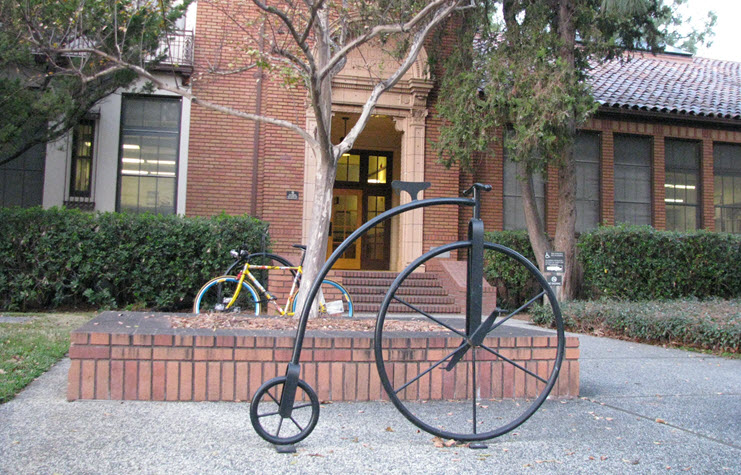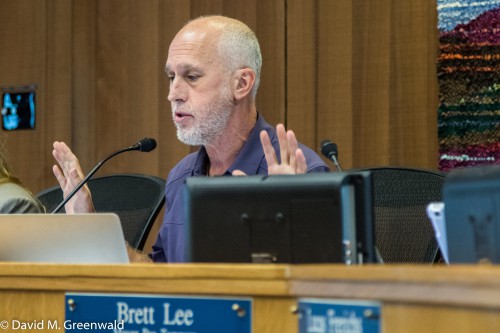

For months we had heard that the city’s fiscal situation had improved – and in some ways it certainly had – but beneath the good news was trouble. The city’s infrastructure needs were critical and last spring the number of $655 million emerged.
One of the council goals has been to create a resilient fiscal budget, and yet the word we heard this week was not one of resilience or renaissance, but “insolvent.” Insolvent in the sense that the city right now cannot meet basic infrastructure needs. Insolvent in the sense that the city is going to have increasing difficulty meeting its pension and retiree health obligations.
We were dismayed to see city staff once again playing down these challenges, while we were encouraged to see the Davis Enterprise offer a front page story of the city’s growing unfunded liabilities. Broad swaths of this community are unaware of the impending problems we face – the worst part is the problems are multipronged, long-term, and have no simple solution.
This situation is actually a good deal worse than it seemed last spring. Mayor Robb Davis called the situation “urgent” and, despite efforts at cost-containment, there was a huge jump in the city’s unfunded liabilities for pensions. That situation is only going to get worse because CalPERS (California Public Employees’ Retirement System) has not been able to sustain their targeted annual rate of return.
The biggest problem we face is that if we do nothing new in terms of salaries and benefits, the cost of maintenance increases.
As Mayor Robb Davis points out, if salaries grow by 3 percent, which is the level that CalPERS assumes and a level that keeps up with a traditional cost-of-living increase, “the pension contributions will require an additional $5.3 million per year.” That is on a $60 million or so general fund.
Mayor Davis told the Vanguard, “If the average annual General Fund revenue growth of the past 15 years continues for the next five (the 15-year trend is 4.8% per year), fully a quarter of the increases will be consumed uniquely by pension and retiree medical cost increases.”
For Mayor Davis, “while it is true that we are ‘keeping up’ as things stand currently, the cost of ‘keeping up’ continues to grow and that crowds out funding for other projects our community needs to maintain the level of service citizens expect.”
“Something must give,” he said. “Thus, I am less sanguine than our City staff. In fact, it is not clear to me at this point how we are going to cover everything over the next five years, given that we are not even covering critical infrastructure backlogs now.”
That is just one area of concern. We have been hitting on the roads analysis for quite some time. One analysis I saw is that, at the current level of funding for roads, we can expect them to degrade to about a PCI (Pavement Condition Index – the standard for evaluating pavement conditions) level of 37. At the start of the recession we had it at 71 and it is currently at 63, one of the worst in the region.
That is the problem – it is serious, multifaceted and there is no simple solution.
Mayor Robb Davis said, “I believe we must discuss cost containment—broadly writ—and put a revenue measure before the population in the next two years.”
What does that look like? The mayor said, “It is no exaggeration to say that over the coming 5 years (and beyond) we need an additional $15-29 million each year to cover all these costs combined.”
Rich Rifkin has long advocated for a total compensation growth gap. He suggests limiting the growth of salaries and benefits to 2 percent per year.
That would be tricky – and it might not be enough. First, employee groups would have to agree to that provision through the collective bargaining process (CBA). Second, we have noted that even keeping compensation steady will add to the budget and that a 3 percent salary increase adds about $5 million to the budget annually.
The short-term answer is probably going to look like this. First, some sort of cost-containment strategy. The Vanguard was really critical, first that the city gave out small raises in the CBA to five bargaining units last year at this time. The Vanguard has also been concerned about overly-rosy language coming from both elected officials and city staff, that plays down the severity of the city’s fiscal problems.
Second, as the mayor stated, we are looking at tax increases. We have already increased sales tax by one percent since 2004. There was talk about a parcel tax for roads. There is already a small parcel tax for parks that is at $49 a year, but that is about a quarter of our current needs – which are expected to rise.
Third, the council sees TOT (transient occupancy tax) as the quickest revenue enhancement. They have already approved Embassy Suites and the Hotel Conference Center, which settled its suit this week. On Tuesday, they look to approve the Residence Inn, and in two weeks it will be Hyatt House.
But, at most, that is perhaps $1 million in TOT. The bigger tickets were innovation parks and other economic development. This is clearly the direction that they will ultimately have to head toward.
The biggest component will be bringing the community along – because, until now, the community has not been aware of just how “urgent” the situation is.
—David M. Greenwald reporting

This situation reminds me of the Bolivian airplane company, LaMia, as recently piloted by Miguel Quiroga.
The pilot and owner of the charter-plane company crashed killing himself and most of his occupants (that happened to be a Brazilian soccer team). He ran out of fuel. After all the government rules were applied delaying and extending his flight plan, knew he was running out of fuel as he approached the Bogotá, Colombia airport, but did not declare a fuel emergency… and hence was put in a holding pattern stacked up behind other flights that had arrived first. The pilot and co-owner of the company appears to have been gambling that he would have the fuel to land without declaring the emergency that would have caused the control tower operators to put him to the front of the queue to land first. The speculation is that he did not declare a fuel emergency because it would have led to sanctions that could have grounded the company and potentially put it out of business.
So Davis is a slow moving jumbo aircraft running out of fuel with all the residents onboard. Robb Davis is declaring a “fuel” emergency. Unfortunately with Measure R and lawsuits, Mike Harrington and his friends are the pilots.
“First, employee groups would have to agree to that provision through the collective bargaining process (CBA).”
The employee unions need to wake up an realize that they are doing their members a disservice by demanding the City pay wages and benefits that the City is unable to afford. At some point the only choice the City is going to have is to discharge the unfunded liability in bankruptcy court and the current and retired City employees are going to have to take reduced retirement payments.
Sam – this makes logical sense, but you only need to look at the standard behavior of employee unions to understand it is an empty expectation. Remember Hostess Corporation? http://www.cbsnews.com/news/twinkies-maker-hostess-going-out-of-business/
Is it rational behavior to strike and demand wage increases that put the company out of business?
And these were private-sector unionized workers… not public sector union employees that can push for never ending tax increases.
There isn’t an insolvent city in the state where the employee groups have come forward with a plan to help put the city budget back in the black. All the employees are trying desperately to get to their retirement before the well runs dry. the unions don’t support any reduction in head count, and the union bosses also are trying desperately to get to retirement.
The solution needs to be making the well run dry.
Rich Rifkin has been prescient regarding underfunded future employee benefits. He’s written several excellent articles over the last few years which would be interesting to review.
Several years ago a Sacramento resident, who works in Davis, was shocked that I did not know that the City of Davis is (was) a “destination employer”. He proceeded to educate me that a destination employer pays wages and benefits far above comparable government jobs. At that time he was aiming to get only five, yes FIVE, years of employment, followed by (partial but generous) lifetime benefits.
After his ‘retirement’ he told me that that particular opportunity was discontinued but he and others are effectively grandfathered in.
Yes, getting a City of Davis job is like winning the lottery in terms of generous salaries and benefits.
Chickens coming home to roost, Malcom X 1963